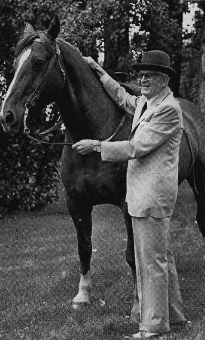Articles/Essays – Volume 04, No. 4
President David O. McKay: 1873-1970: “When Spirit Speaks to Spirit”
The deep sense of sorrow that I felt upon hearing of the passing of the prophet was incurred not because of any direct relationship I’ve had with him, nor was it the type of remorse that is prompted by the anticipation of missing or being without a loved one.
My sorrow was motivated by a fear, a fear that was couched in the recognition that there are those members of the Church, i.e., new converts, young people, etc., who have known President McKay only as a white haired man who because of the aging process needed to be assisted constantly and who “usually spoke about the family” rather than as a vigorous, athletic, inspired Prophet, with profound insights on making this life a great experience.
I’ve resented the demeaning attitudes of some within and outside the Church who respected the kindly David O. McKay, but felt he never spoke out on the major contemporary issues. His discourses on the Family, Father hood, Motherhood, the Christ-like acts, etc., were felt by some to be “skirting the real issues of our time.” My personal life has been enriched by the counsel of President McKay because, for me, rather than skirting issues he went straight to the very core of the problems of our society.
The central problem of our society and our larger world community is the lack of Christ-like character. Poverty, immorality, man’s inhumanity to man, violence, etc., the influences that Professor Toynbee found to be destructive of any civilization, are the results of the lack of the Christ-like char acter in man. President McKay dealt with the cause of these problems. His was the voice of a prophet who was concerned with the prevention of the social disorders of our time. President McKay’s writings were not the philosophical exercises of a Pratt or Talmage, but rather a penetration through the superficial into some of the very practical everyday acts that any man, anywhere, in any situation could do to bring into his life the peace and serenity that come only with putting into practice the gentle and emphatic principles of Christ.
To me, David O. McKay was the paradigmatic man of our dispensation in exemplifying, through the written and spoken word, the rewards of Chris tian living. I’ve felt that no man with whose life I’ve been acquainted has lived this type of life more profoundly than he. For this reason I have become greatly concerned to search out, through studying the insights of this man, the keys to the happy life for myself, and I have personally resolved that my children and the university students I teach and counsel at the L.D.S. Institute at Stanford will have further opportunities to know the prophet. It would be a great tragedy if the writings of President McKay, with their sense of urgency as it relates to the family as the vehicle by which personalities and attitudes can be changed, were to end up as “dust collectors” in our personal libraries.
There is a need in our Church to respond to the living prophet, Joseph Fielding Smith, and to his insights and clarifications, but there is also the necessity for us to reread and retell and reacquaint ourselves with the inspiration and revelations which were given to the living prophet of the 1950’s and 60’s.
Perhaps my fears that the Gospel as mediated by the prophet will have its impact diminished with time are unjustified, but my desire is that his writings and insight should live on. Not as mere memorial—for this would have been repugnant to him, but rather because the joy, happiness and sense of awareness of the good life which I’ve found are a direct result of “the secrets of the happy life” which flowed from the pen of David O. McKay. I’ve become a better man, a better husband, a better father because of the application of the above suggested principles. Only my wife and God really know how true and significant that change has been.
President McKay’s spirit has spoken to my spirit through the written word, and I was edified; and because I was edified I could give of self to my family, friends, and neighbors.
Joseph C. Muren
Sunnyvale, California


 Back to full Issue
Back to full Issue

